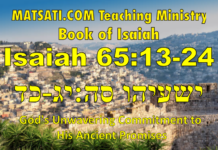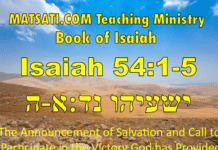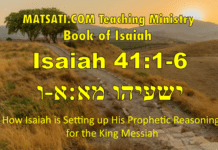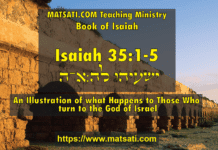This weeks reading is from Parashat Mishpatim (Shemot / Exodus 18:1-20:23). The reading is titled “Mishpatim” meaning ordinances (הַמִּשְׁפָּטִים); Moshe gives the ordinances the Lord is setting before Israel. How to treat a Hebrew slave (21:2), what to do if your daughter is sold into slavery (21:7-9), a man is not to reduce food, clothing, or conjugal rights to his spouse (21:10-11). Rulings on premeditated or accidental murder (21:12-16). Rulings on men fighting, if one is injured, the injured man is to be compensated for the loss of work. If men are fighting and strike a woman and she miscarriages, the family is to be paid compensation for the loss of life (21:22), any other injury, the ruling is an eye for an eye and tooth for a tooth (21:23-25). God’s purpose for instructing the people on what to do in the cases of injury (eye for eye and tooth for tooth) is to treat each other with justice, the penalty must fit the crime. Rulings regarding a man’s property, cattle, fields, are detailed (22:3-14). Witches are not permitted to live (22:18), bestiality is forbidden (22:19), and who ever sacrifices to any other god is to be put to death (22:20). Be good to the stranger (22:21), do not oppress the widow or orphan (22:24). No interest is to be charged on loans made to a child of Israel (22:25). Dedicate the first born to the Lord (22:29-30). The seventh year rest for harvesting (23:10-11) along with the shabbat rest from working (23:12). The mitzvah of Shalosh Regalim (שָׁלֹשׁ רְגָלִים) to celebrate three yearly festivals is given, (i) Pesach and the Feast of Unleavened Bread (23:14, חַג הַמַּצּוֹת), (ii) the Feast Harvest of First Fruits (23:16, חַג הַקָּצִיר בִּכּוּרֵי), and (iii) the Feast of In-gathering at the end of the year (23:16, חַג הָאָסִף).
כתבי הקודש / The Holy Scriptures
ספר שמות פרק כא
כב וְכִי-יִנָּצוּ אֲנָשִׁים וְנָגְפוּ אִשָּׁה הָרָה וְיָצְאוּ יְלָדֶיהָ וְלֹא יִהְיֶה אָסוֹן עָנוֹשׁ יֵעָנֵשׁ כַּאֲשֶׁר יָשִׁית עָלָיו בַּעַל הָאִשָּׁה וְנָתַן בִּפְלִלִים: כג וְאִם-אָסוֹן יִהְיֶה וְנָתַתָּה נֶפֶשׁ תַּחַת נָפֶשׁ: כד עַיִן תַּחַת עַיִן שֵׁן תַּחַת שֵׁן יָד תַּחַת יָד רֶגֶל תַּחַת רָגֶל: כה כְּוִיָּה תַּחַת כְּוִיָּה פֶּצַע תַּחַת פָּצַע חַבּוּרָה תַּחַת חַבּוּרָה:
Shemot / Exodus 21:22-25
21:22 ‘If men struggle with each other and strike a woman with child so that she has a miscarriage, yet there is no further injury, he shall surely be fined as the woman’s husband may demand of him, and he shall pay as the judges decide. 21:23 ‘But if there is any further injury, then you shall appoint as a penalty life for life, 21:24 eye for eye, tooth for tooth, hand for hand, foot for foot, 21:25 burn for burn, wound for wound, bruise for bruise. (NASB)
I was asked this week “why do we have to read all of these rules and regulations?” Most often it has been taught that the mitzvah (command) eye for an eye and tooth for a tooth is harsh and unmerciful, and is a judgment that is given by a harsh and unmerciful God. The interesting fact is, these rulings actually provide structure, justice, and righteousness in a court of law such that the guilty person’s punishment would fit the crime. In antiquity, the wealthy could inflict harsher punishments then the crime required and so God was providing justice in the midst of sin. In the reading this week, we are told how to treat a servant (21:2), a man is to treat his family fairly, not to reduce food, clothing, or conjugal rights to his spouse (21:10-11). Rulings on men fighting one another and compensation for the loss of work or life (21:22). Any other injury, the ruling is an eye for an eye and tooth for a tooth (21:23-25). Rulings regarding how we are to treat someone else’s property (i.e. cattle or fields, 22:3-14). We are told to remember where we come from and therefore be good to the stranger (22:21), and do not oppress the widow or orphan (22:24). Yeshua answered the rich young ruler in Matthew 22:36-40 about the greatest commandment in the Torah saying:
Matthew 22:36-40
22:36 “Teacher, which is the great commandment in the Law?” 22:37 And He said to him, “‘You shall love the Lord your God with all your heart, and with all your soul, and with all your mind.’ 22:38 This is the great and foremost commandment. 22:39 The second is like it, ‘You shall love your neighbor as yourself.’ 22:40 On these two commandments depend the whole Law and the Prophets.” (NASB)
God’s purpose for instructing the people on what to do in the cases of injury (eye for eye and tooth for tooth) is to treat each other with justice, that the penalty must fit the crime. The Scripture for this week details how we are to live our lives before God. Our relationship with others is in fact directly proportional to our relationship with God. Reading through the Mishpatim (ordinances) this week, if we “love our neighbor as ourselves” as Yeshua taught we would not violate one of these commandments. The command to love others is more than a rule to follow; it is motivated by God’s character and made possible only through faith in His Messiah and by the power of His Holy Spirit. BTT_Parashat Mishpatim-2013








